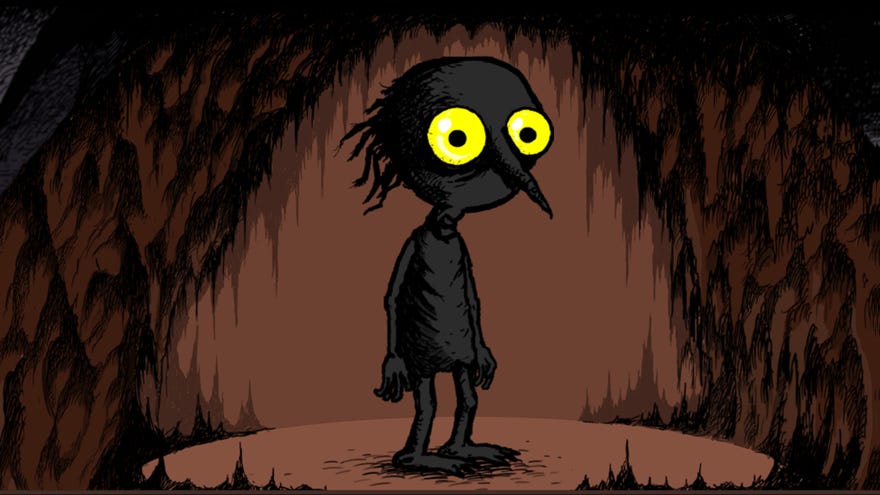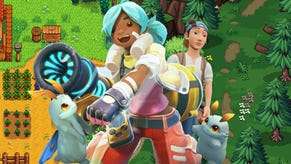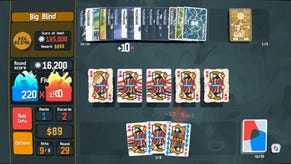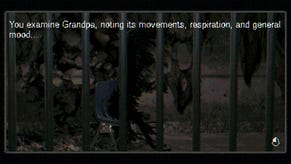Why real-time idle adventure games have "radical potential"
The developers of The Longing and Time Bandit on temporal experiences in their weird, cool games
“At some point," says Joel Jordan, "Animal Crossing poses the question to you with alarming force: how do you want to spend your time?”
Allow me to open with the scoundrel’s refuge that is a seemingly weighty dichotomy: I reckon there’s two really special types of indie games. Those that work wonderfully despite their smaller scope, and those that work wonderfully because of it. It’s that second kind - the particular and peculiar voyages into the miniature and mundane - that really spin wonders. Games like Unpacking, PowerWash Simulator, and Dinkum. Games humble enough in scope, and curious enough in outlook, to be uniquely capable of framing everyday experiences so that their inner oddness and strange magic - unfairly dulled by familiarity - shines.
So, when Jordon - solo dev on the upcoming Time Bandit - brings up the question: how do you want to spend your time? I’m left pondering it for far longer than I think I otherwise would, thinking about it in context. The obvious answer here is: playing an videogame, please. But Time Bandit’s free demo doesn’t take long to make me almost uncomfortably aware that there’s more than one way to play something. I don’t even need to be anywhere near the PC. I might actually be playing it more when I’m not [X-Files music, but also I’m going somewhere with this].
“Time Bandit started from the idea of using the real-time mechanics of Animal Crossing in a more goal and story drive adventure game that would explore themes of temporality. Explicitly in the context of labor, and using an expressly anti-capitalist narrative,” says Jordon. Spoon it unto my eyeballs immediately, says I.
Jordon initially started playing Animal Crossing as a replacement for Michael Brough’s VESPER.5 - a ritualistic mediation that allows the player to take just a single in-game step per real-world day. That brief moment of play, each day, became important to them. After spending the required 100 days needed to finish VESPER.5, Jordon found themselves in the company of Isabel and co, but quickly found the more “work-y” parts of the game tedious.
They began to check in each day just to talk to the villagers, listen to music, water flowers, and stroll along the beach. This, says Jordon, struck them as the “real radical potential” of Animal Crossing. Essentially, the quiet disruption of turning an explicitly checklisted experience into a hangout space, and finding their own version of beauty - “aesthetic points of interest,” - within familiar game loops. The choice of deliberately not engaging with the game’s rife “commodity exchange elements” resonates much more powerfully, says Jordon, than it otherwise would be in games that offer a more relaxed experience
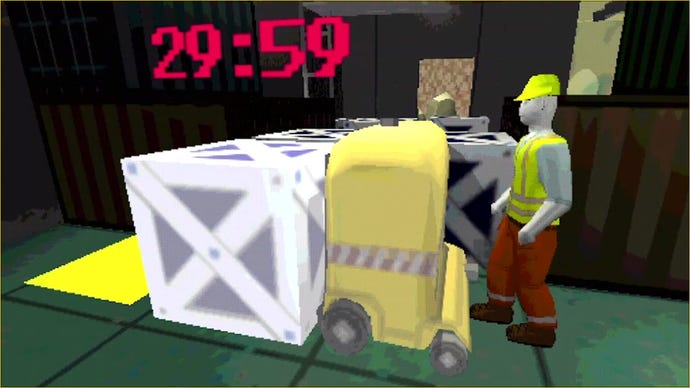
A quick glance at Time Bandit immediately evokes classic Metal Gear Solid, right down to the Soliton radar, codec calls, and crate-based espionage, but rendered in the sort of lovingly shonky lo-fi you might see in a Cosmo D game. But a brief peeling of the genre-orange unveils great sopping segments of vitamin-ooooo! enriched esoterica. A unique mix of idle game, puzzle, stealth, and narrative adventure. It scans, then, that Jordon has “an unusual relationship to genre.” It’s less interesting, they say, to define genres than to see how “a lot of farflung genres exhibit different evolutionary trajectories extending from the same origins – videogames are all D&D and Colossal Cave Adventure, really. You could roughly divide up a lot of subsequent history by whether games focused more on the numbers or more on the story elements of those games.” Jordon admits this is a huge generalisation that they don’t fully mean, “but I think there’s some truth to it. “
As your worker enters the factory at night to try and steal time crystals from their employer, you might even run into some bullet hell sections. To Jordon, stealth isn’t all that different from dodging bullets, “if you think about it abstractly, in terms of space. Just that it’s suddenly become much more difficult to find space that it’s safe to stay in.” I’d not considered this before, but I’m inclined to agree. Pictured it in terms of the Metal Gear-esque vision cones Time Bandit uses, you’re effectively maneuvering yourself around a slow moving AOE attack. “I thought it made perfect sense if, as a punishment, a stealth game would turn into a bullet hell when you got caught – it still gives you a chance to escape but it’s much harder.”
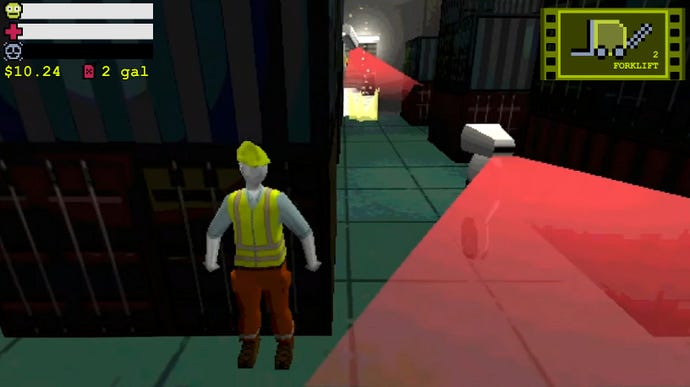
But neither stealth or bullet hell offer much without interesting environments, and its here Jordon looked to games like Pikmin and Mario 64, inspired by their open approach to level design. In Time Bandit, they say, your choices early on in opening up shortcuts, or creating obstacles for yourself, will have a big impact further on, when you’ll be retracing your steps. Later on, when guard patrols become more difficult, it’ll be much safer to sneak out time crystals if you’ve spent time opening alternative paths. Ultimately, you’ll want to be thinking ahead, because actions have lasting consequences that ripple throughout the game.
But wait! Is that the sound of you regretting your trust in the rakishly handsome salesman in a legume costume who once convinced you to build your house entirely out of peanuts? Perhaps, because it’s time to confront the elephant in the room. By centering a game so explicity around play-as-work, Time Bandit effectively pulls the game design equivalent of saying the quiet part out loud. A lot of very rich idiots pay smart but flexibly scrupled people piles of money to figure out how to best obscure nefarious loop-de-loops of simulated, laborious progress from perspective players - or at least gloss it up in so much pavlovian prettiness that it resembles something truly rewarding. Isn’t putting this stuff upfront a losing battle, even in the service of big, sexy themes? But Jordon’s take on the matter hits me as hugely illuminating.
“Work is actually enjoyable, the part of capitalist work that’s not enjoyable is just the fact that the work and the products don’t belong to us.” Jordon laments how many recent games resemble the latter kind of capitalist work - you’re given a list of tasks to check off, “instead of approaching the game like your own project to complete. We seem to not only tolerate but positively enjoy unending amounts of repetition.” What’s interesting to explore, they say, is where the tipping point is. Players might love Death Stranding, but not Chulip. “My thought is that it has to do with when the game makes it too transparent how you’re spending my time.”
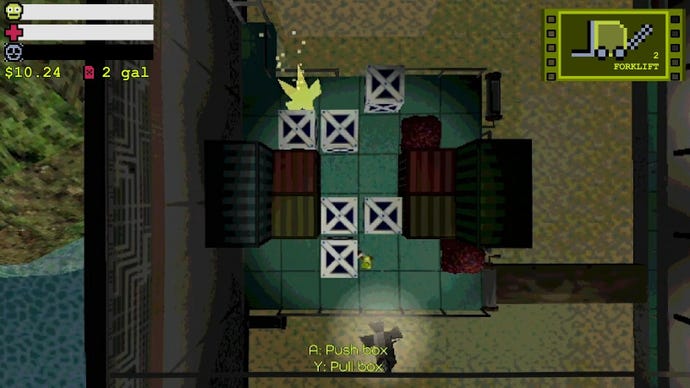
Framing these kind of explorations in Time Bandit involves “a lot of other narrative techniques” from Brechtian theatre, like developing all of the characters as representatives of their precarious economic situation and how they respond to it, but real time is a pretty unique tool that I had for getting players to integrate the game into their life and remind them of the real world all the time.”
For those only tangentially familiar with Bertolt Brecht (i.e me), professor Robert Gordon describes Brecht’s approach to theatre as encouraging the spectator "to view the way in which playwright and actors presented the tale, exposing the mechanisms of theatre, and promoting an attitude of curiosity rather than the emotional and empathic response to the acting typical of the naturalistic and expressionistic forms dominant in German theatre at the time.” That’s a mouthful, so here’s old mate Wikipedia: “The purpose of epic theatre is not to encourage an audience to suspend their disbelief, but rather to force them to see their world as it is.”
"If we know that the game is running without us looking at it, it creates a truly virtual room in our mind because we know it must be there.”
Either way, I’m glad Jordon brought up Brecht and alternative theatre. Perhaps somewhat paradoxically, I don’t think there’s a single genre that involves the player quite as much as idle games, in the sense they absorb your own day to day experiences into their inner workings. Your schedule and distractions. Your emotional state. Even the way you view leisure time becomes a game mechanic. And if there’s one other game that can be said to invite the player into a shared performance, its Studio Seufz’s wonderfully melancholic, 400 day plushie advertisement The Longing.
“It's really quite fascinating how a game can occupy a part of the brain and continue to live there,” says designer Anselm Pyta. “If we know that the game is running without us looking at it, it creates a truly virtual room in our mind because we know it must be there.”
As befits something so reliant on the player’s input, much is lost in summing up The Longing that doesn’t also take into account the experience of player discovery. Alice Bee’s diary playthrough frames the act of playing not so much as making progress, but simply making player character The Shade’s life less unbearable through a checklist of kindnesses. To wit, though, the game is effectively an adventure game you can choose not to play and still finish, providing you’re willing to wait over an entire actual year, and are also an entire actual heartless bastard, happy to abandon the Shade to an eternity of titular pining for his slumbering liege.
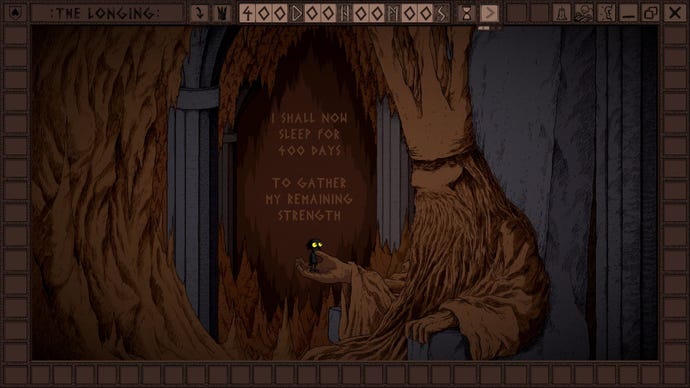
The setting and mood of the game, says Pyta, came from a visit to Germany’s Barbarossa cave, and learning about the “Kyffhäuser legend of the sleeping king under the mountain. The legend was made into a poem, which mentions a ‘dwarf’ staying as the loyal servant of the king who is tasked with checking every 100 years if the time is right for the king to rise again.” The poem only mentions the dwarf briefly, but Pyta says it got him thinking about how this servant’s life would look. They couldn’t sleep all the time - they’d have to find something to do. A few years later, Pyta got into the idle game Clicker Heroes. “I found the idea of using offline progression for a game incredibly enchanting.”
“Tamagotchis and virtual pets were in the back of my head too, but the difference between idle games and virtual pets is normally that the Tamagotchi will annoy you to take care of it,” he explains. I’m picturing a version of The Longing’s Shade that repeatedly pings you to make it Cocoa Pops and clean up spectral coils of shadowy business, and yeah, it would detract somewhat from the Longing’s singularly mournful atmosphere.
“The character I was envisioning wouldn't have to eat or drink to stay alive, it would just get a bit sad over time if left alone. Virtual pets have always proved that something digital can have real emotional meaning to people,” he says. “I was hoping that this emotional attachment would prove true also for The Shade, but it should result in not just the player taking care of the character, but also the player thinking and reflecting about the different possibilities to take the story and eventually end the game.”
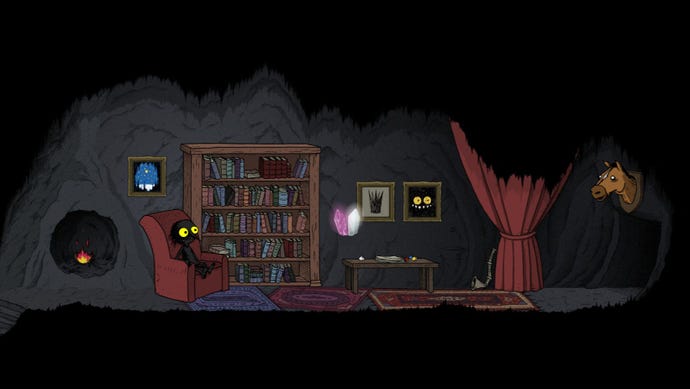
I ask Pyta if he sees value in boredom, as opposed to the constant stimulation so many games seem to take for granted as sacrosanct to engagement. “I certainly didn't want to make a boring game, but something more slow paced that's totally different than other games,” he says. “One of the universal truths seems to me that we need contrast in order to see and feel. If we are bombarded with hyper stimuli in every form of entertainment, it will result in us feeling empty and emotionless and thus, these things will get boring too. That was one of the reasons I thought a game like The Longing could work as a detox for that.”
But besides that, Pyta adds, there is value in boredom “Boredom means feeling the weight of nothingness and time, and many creative ideas and fantastic thoughts can come from that.” So, I’ll borrow Jordon’s words once more then, not glibly, and with utter sincerity, and with the strange realisation that the fear of seeming foolish, even to an audience consisting solely of ourselves, often stops us asking the important questions. To be considered with alarming force: How do you want to spend your time?”
